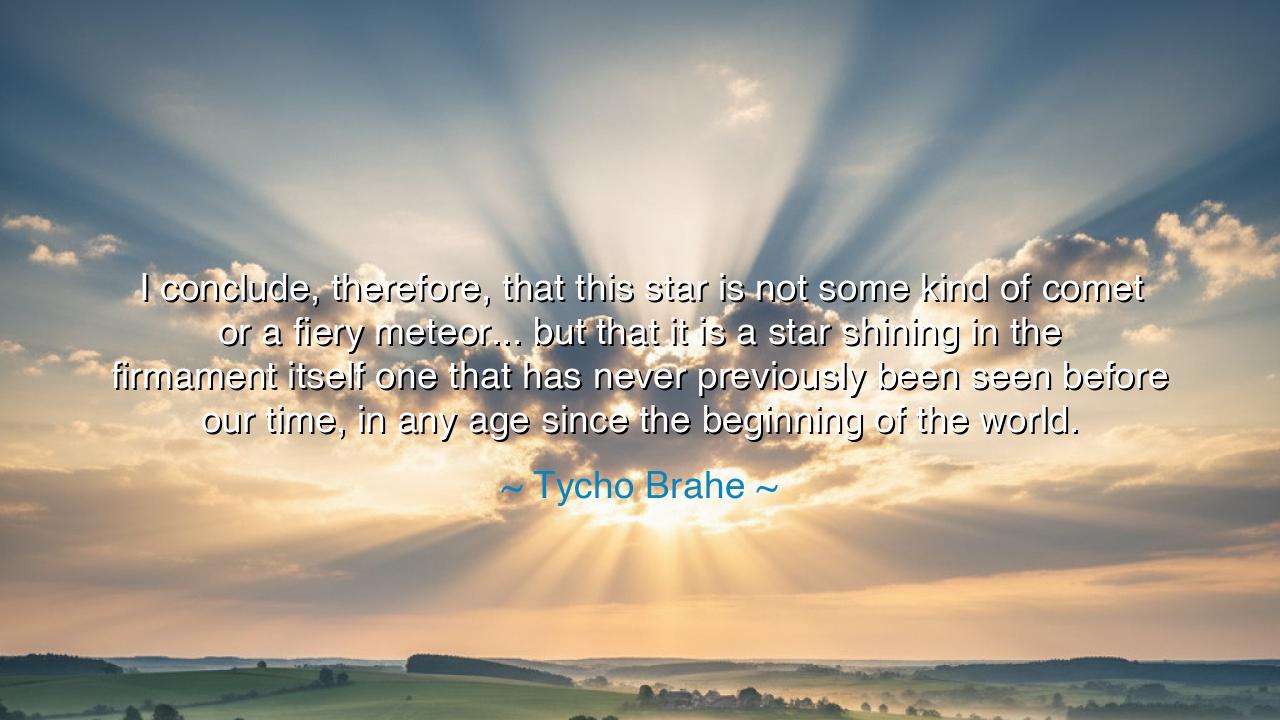
I conclude, therefore, that this star is not some kind of comet
I conclude, therefore, that this star is not some kind of comet or a fiery meteor... but that it is a star shining in the firmament itself one that has never previously been seen before our time, in any age since the beginning of the world.






"I conclude, therefore, that this star is not some kind of comet or a fiery meteor... but that it is a star shining in the firmament itself, one that has never previously been seen before our time, in any age since the beginning of the world." — so wrote Tycho Brahe, the great Danish astronomer of the sixteenth century, a man whose gaze pierced the ancient heavens and shattered humanity’s certainty about the fixed perfection of the stars. In this bold declaration, Brahe proclaimed the birth of a new understanding — that the heavens themselves could change, that the eternal lights above were not beyond the touch of transformation. To his age, this was heresy; to posterity, it was revelation.
In the style of the ancients, one might say: when the heavens tremble, the mind of man awakens. For in 1572, as winter approached over Denmark, a new star blazed in the constellation Cassiopeia — bright enough to be seen even in daylight. The people trembled; they called it an omen, a sign from the gods, a herald of doom or renewal. But Tycho Brahe, calm and resolute, sought not fear but understanding. He observed with instruments of his own making, measured with patience, and concluded what few dared to believe: that this was not a passing flame, not a wandering comet, but a new star born in the supposedly unchanging heavens.
Before this moment, the great Aristotle had taught that the celestial realm was perfect, immutable, untouched by decay or birth. His word had ruled the minds of scholars for two thousand years. Yet in a single night of observation, Tycho Brahe overturned an empire of thought. He showed that the cosmos itself could evolve, that creation was not finished, but still unfolding before human eyes. The discovery of what we now know as a supernova was more than a scientific triumph — it was a spiritual awakening, a reminder that truth is never final, and that the universe still speaks to those who dare to listen.
Consider the courage of that moment. In an age when doubt could mean exile or worse, Brahe stood against tradition, declaring, “This star has never been seen before in any age since the beginning of the world.” To utter such words was to proclaim that the old world of certainty had ended. He was, in that instant, both scientist and prophet — a bridge between medieval faith and modern reason. Like Prometheus stealing fire from the gods, he brought new light to humankind, proving that even the heavens could change and that knowledge was not a divine secret, but a human pursuit.
Yet Brahe’s revelation is not only about astronomy; it is a parable of the human spirit. The star he saw in the sky is the same star that burns in every soul — the light of discovery, the courage to question what has long been accepted. Just as he lifted his eyes and refused to be blinded by authority, so must we lift ours, in whatever darkness we find ourselves. For new stars are not only born in space — they are born in hearts that dare to see what others deny. The unknown, once feared, becomes a source of wonder when approached with courage and reason.
From Tycho’s new star arose the dawn of modern science. His careful records inspired Kepler, who would later uncover the laws of planetary motion, and Newton, who would describe the invisible force binding heaven and earth. Thus, from one man’s observation grew the foundations of modern astronomy, and with it, a new way of knowing the world — through evidence, patience, and faith in human reason. The heavens, once thought to be distant and divine, had become knowable — a vast cathedral open to all who would look with disciplined wonder.
The lesson, then, is this: never assume that what has been will always be. The world, like the sky, is full of new stars waiting to be seen — but only by those unafraid to question the old constellations. Seek truth with humility, but defend it with courage. Let curiosity be your compass and perseverance your telescope. The light of discovery shines not only for the scholar but for all who refuse to let fear dim their sight.
And so, my child, remember the courage of Tycho Brahe, who dared to say that the eternal had changed. When others cling to the comfort of certainty, be the one who looks upward and asks, “What if the heavens are not finished?” For every generation must find its own new star — not in the sky, perhaps, but in the soul — and proclaim, as Tycho once did, that even in a world long known, wonder has not ended.






AAdministratorAdministrator
Welcome, honored guests. Please leave a comment, we will respond soon